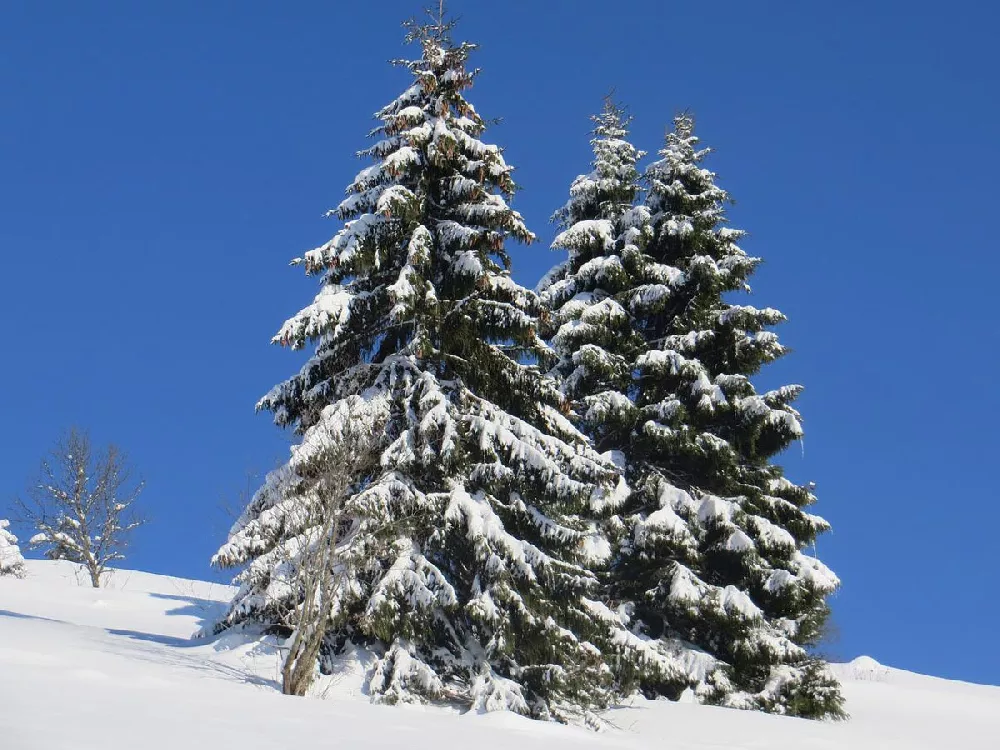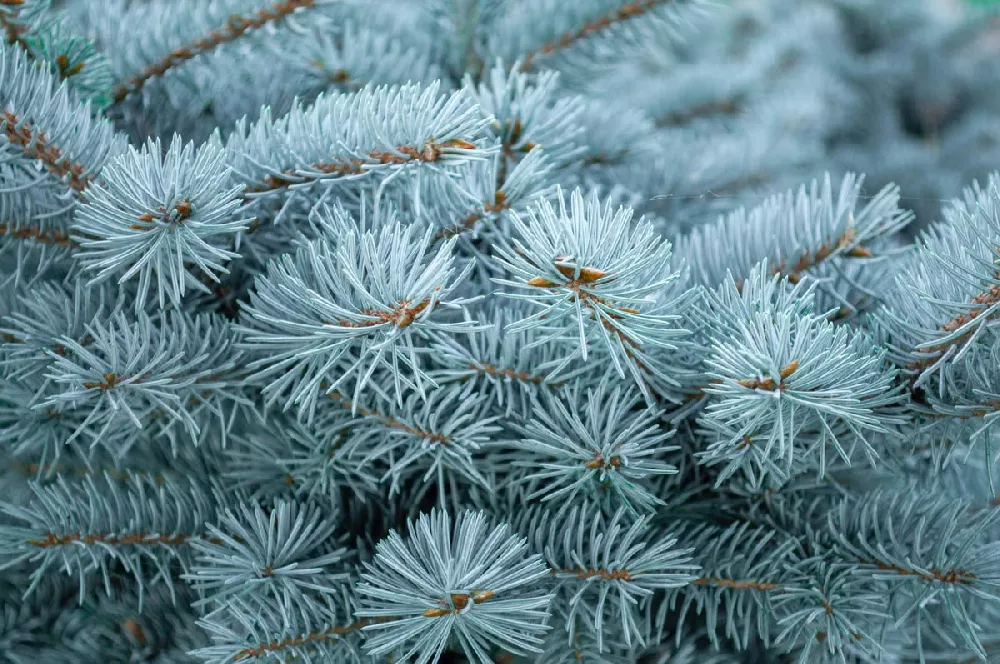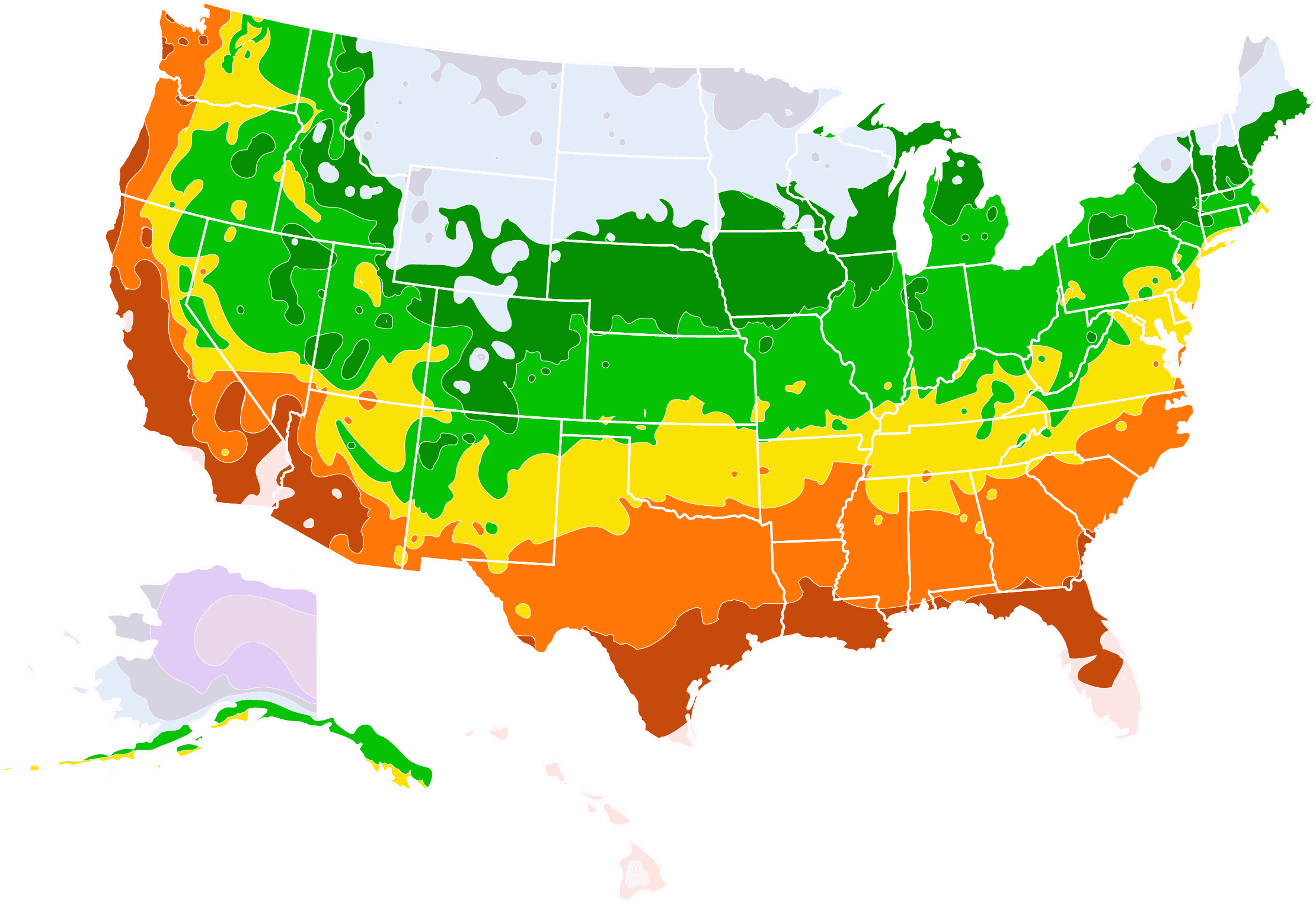- Home >
- Spruce Trees >
- Meyer Spruce Tree
Meyer Spruce Tree for Sale - Buying & Growing Guide
If you are a fan of the blue spruce, then you'll likely be fond of the Meyer spruce as well. Like the blue spruce, the Meyer spruce tree, Picea meyeri, has bluish-green needles that are surprisingly vibrant. This species also has a conical form, similar to that of a classic Christmas tree. At times, the Meyer spruce can be a better choice than other spruces, as it proves to have excellent disease resistance. Meyer spruces are also a viable plant choice in many regions — they can survive from USDA zone 8 all the way up to zone 2.
- The Meyer spruce tree has lovely blue-green foliage.
- It offers excellent cold hardiness and disease resistance.
- It has an attractive cone-like shape.
Enter your zip code to find nearby stores that may carry this plant.
Plant Care
Sunlight

Choose a growing location that receives about four to six hours of light per day.
Watering
Water once per week during the growing season.
Fertilizing

Use a nitrogen-rich fertilizer during the spring or the fall.
Planting and Care
Planting instructions
Your Meyer spruce tree should grow in a full sun area, meaning a location that receives at least six hours of direct sunlight per day. These trees also prefer soils that are slightly acidic to neutral. Generally, it’s best if the soil is somewhat loose and well-draining, but there may be some instances in which a Meyer spruce tree will survive in clay soils. You should also anticipate the mature size of your Meyer spruce tree, which may exceed 40 feet tall and 20 feet wide at its maximum size.
Watering and nutrients
The Meyer spruce tree typically needs water about once per week during the growing season, but you may need to increase this watering rate during times of drought or exceptionally hot weather. Meyer spruces also benefit from one or two applications of fertilizer each year. These feedings should occur during the spring and the fall months. When fertilizing, you should use a fertilizer blend that is highest in nitrogen. The next most important nutrient for this tree is potassium, followed by phosphorus.
Pollination
The Meyer spruce tree is a coniferous, cone-bearing species. Like all trees that carry cones, this tree uses wind currents to conduct pollination rather than relying on insects and birds to transport the pollen. Meyer spruces also tend to carry both male and female reproductive structures on a single plant, which makes self-pollination a possibility. However, pollination is not a common concern for gardeners who grow this tree, as it does not produce fruits that people commonly harvest.
Pruning
Meyer spruce trees have low pruning needs compared to other plant species. The reason behind this minimal need for pruning is that the Meyer spruce grows into a pleasing form without the help of pruning cuts. However, while pruning is not necessary on an aesthetic front, it can help this tree’s health. The best time of year to remove dead and damaged portions of this tree is in late winter, just before the tree exits its dormant phase.
Pests, diseases, and animals
One of the greatest advantages of growing a Meyer spruce tree is that this species has excellent disease resistance compared to similar species, such as the blue spruce. Needle cast, a disease that causes spruce foliage to become discolored and fall off the branches, does not often affect the Meyer spruce. Likewise, you’ll likely encounter very few pests or fungal and bacterial concerns with this tree. One of the few problems to be wary of is rot, which usually occurs in soils that have poor drainage.
Achieving maximum results
Sunlight is incredibly beneficial to the Meyer spruce tree. While six hours is enough to keep this plant alive, greater quantities of sun exposure, such as eight hours per day or more, will lead to even more vigorous growth. You should also be careful not to cut this tree back too much when pruning. This plant does not resprout from old wood, so cutting past the outer layer of foliage can lead to permanent bare patches.
FAQs
Where does the Meyer spruce tree come from?
Is the Meyer spruce tree invasive?
Upon learning that the Meyer spruce tree is a cold-hardy, disease-resistant, exotic plant, it is natural to wonder whether it is an invasive species. Fortunately, the Meyer spruce tree is not currently listed as invasive, meaning that it is currently safe to plant wherever growing conditions are suitable. As such, gardeners in the United States can enjoy the benefits of this species without worrying about causing harm to the environment.
Can you use Meyer spruce trees as Christmas trees?
The Meyer spruce tree makes for an excellent Christmas tree for several reasons. The first, and most obvious reason, is that this tree grows into a neat pyramidal form that mimics a perfect Christmas tree shape. This tree also has strong branches, ideal for hanging ornaments and other holiday decor items. The vibrant color of this plant's needles only adds to its holiday appeal.
Compare Similar Products
You can't add more Product Name - Product size to the cart.
OK








